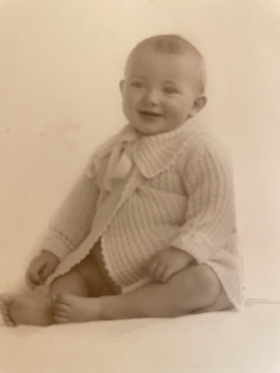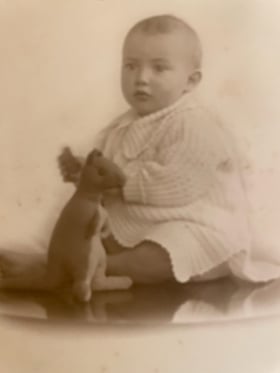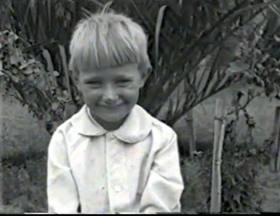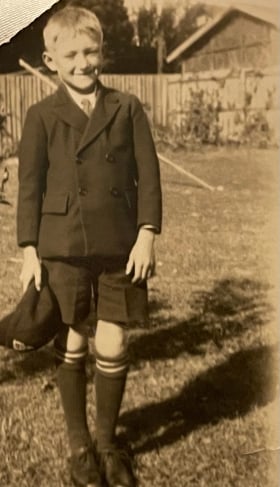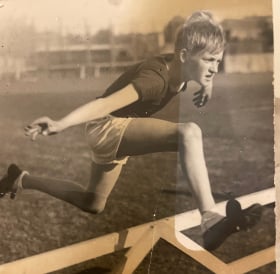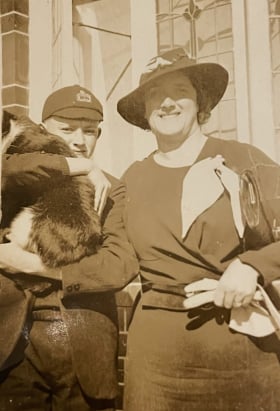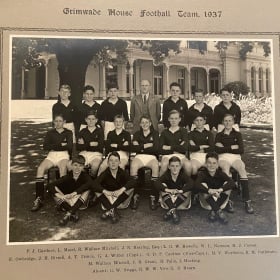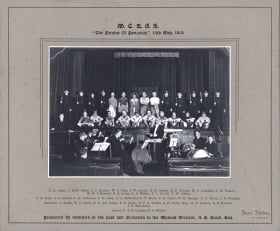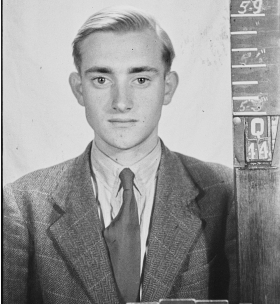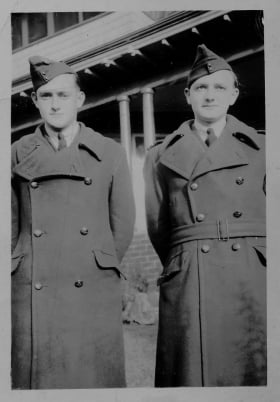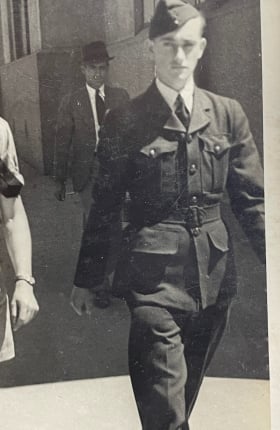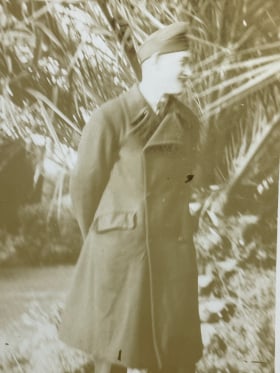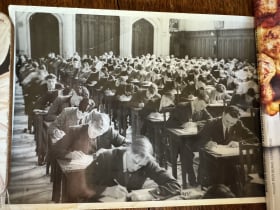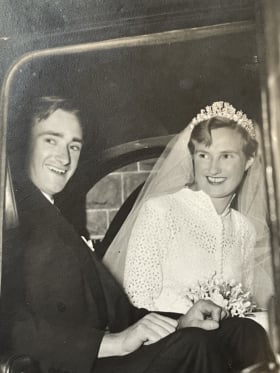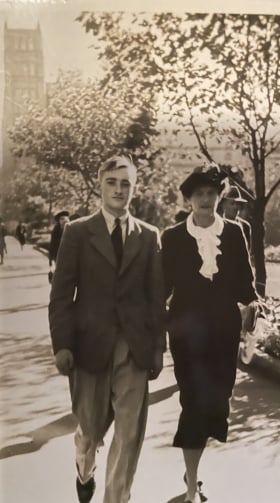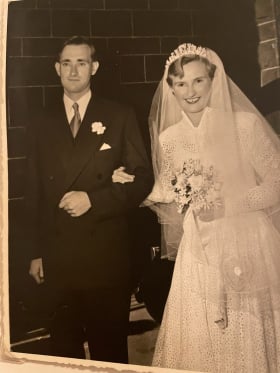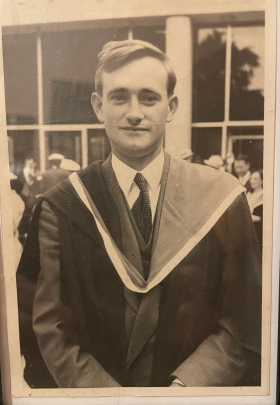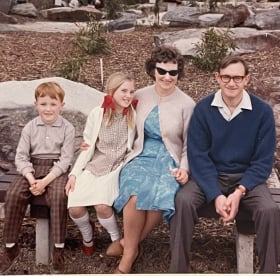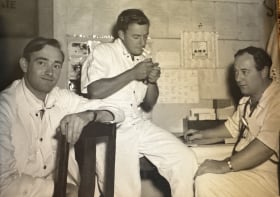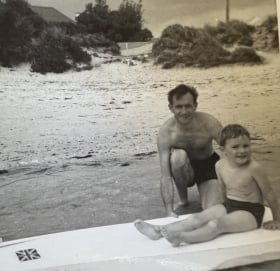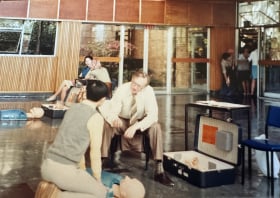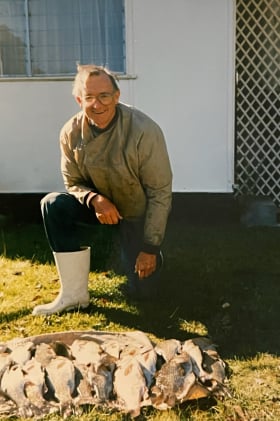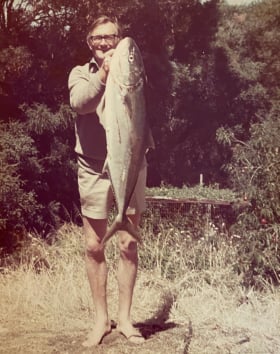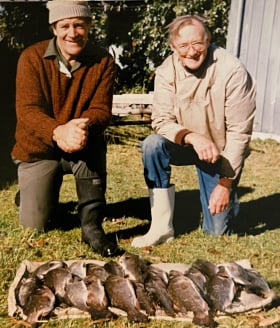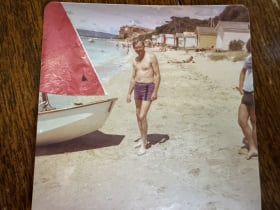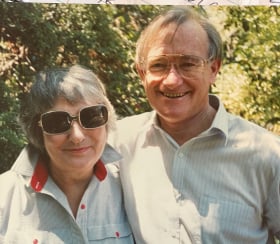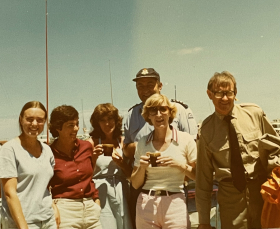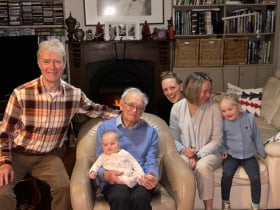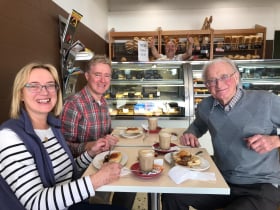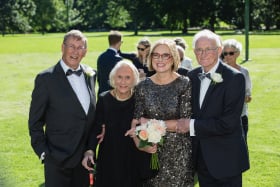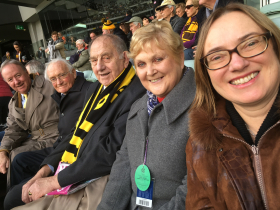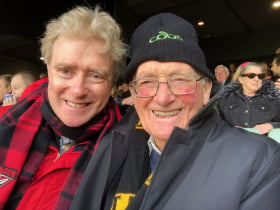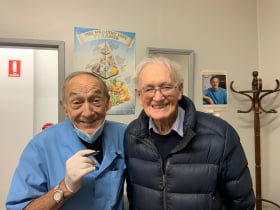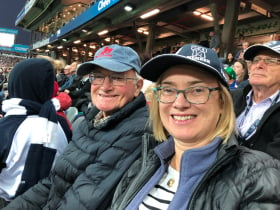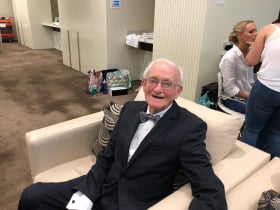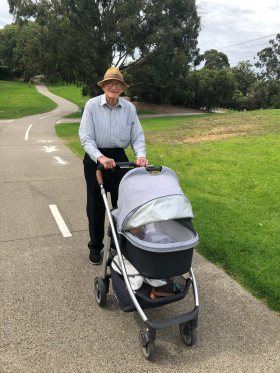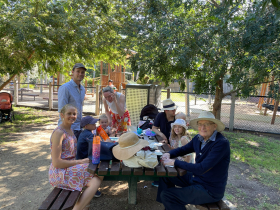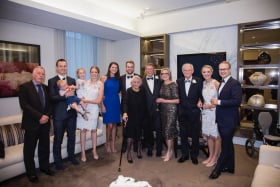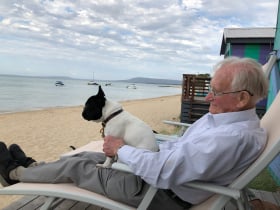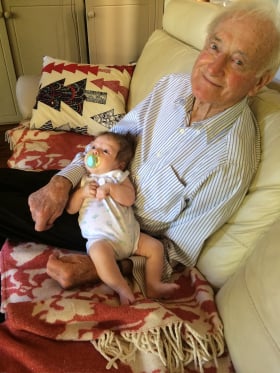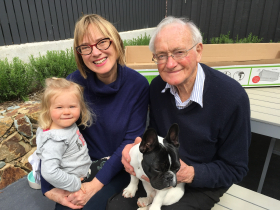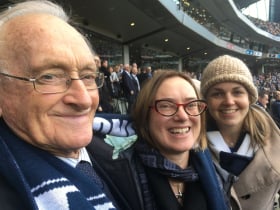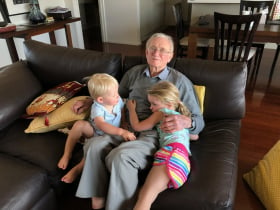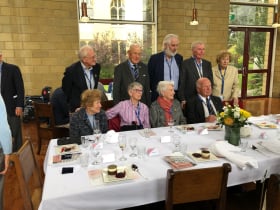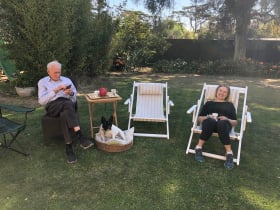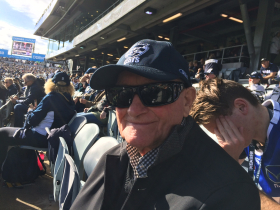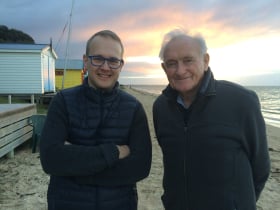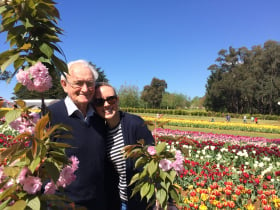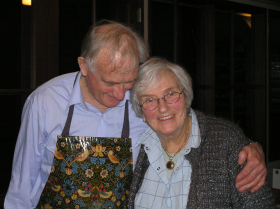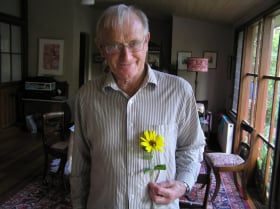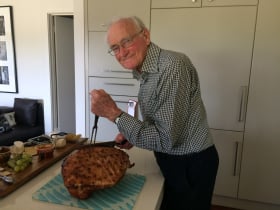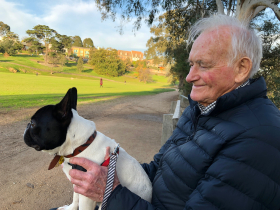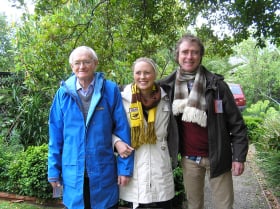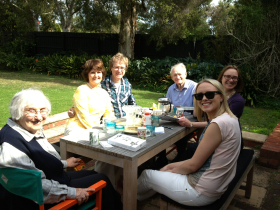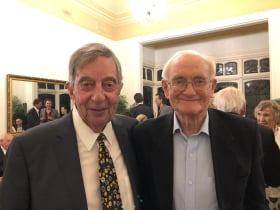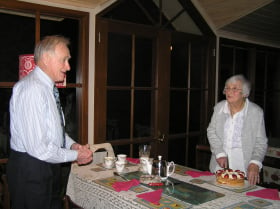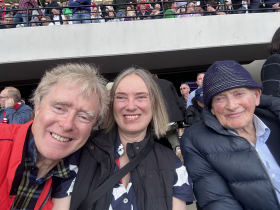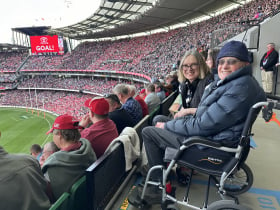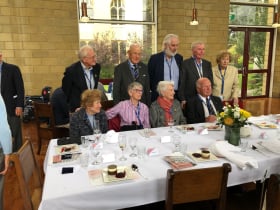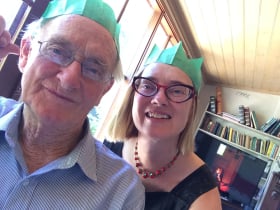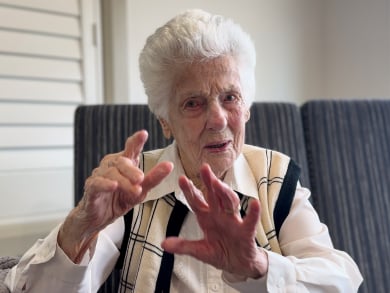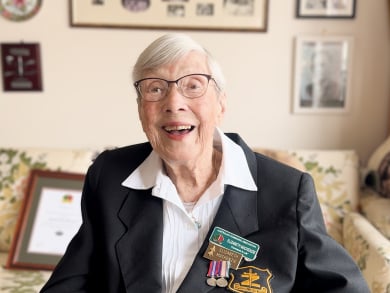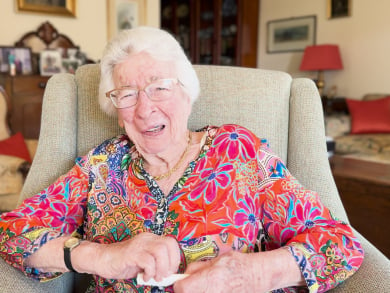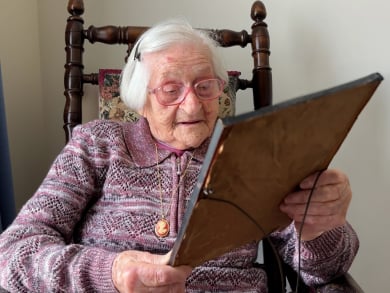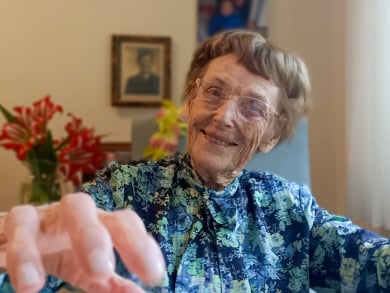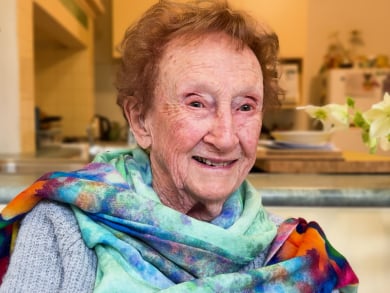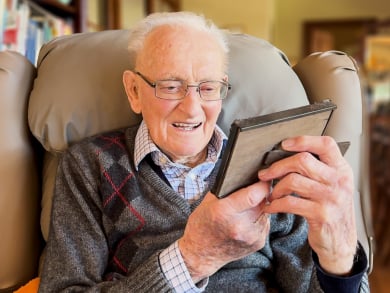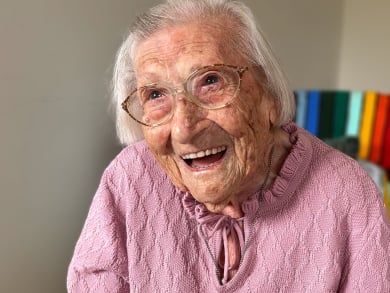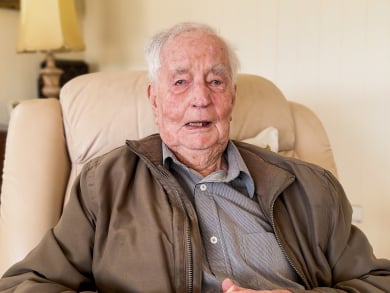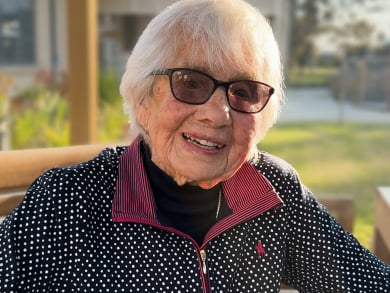So many favourites...
I haven't got just one.
I enjoy music very much.
Very much.
I am the very model of a modern
major general.
I’ve information vegetable,
animal, and mineral.
I know the Kings of England
and I quote the fights historical.
From Marathon to Waterloo,
in order categorical.
My name, Allan Trinca
And I was born
on the 20th of July, 1924.
I was actually born at home.
My mother,
quite proud of that fact, I think.
Dad’s name was Alfred John Trinca.
He was a surgeon
at The Alfred Hospital.
That's a movie of our...
my home early on.
Malvern, Kooyong area.
Yes, that when
my Dad used to....
smoke.
There. Yeah.
There’s Mum.
Margaret Trinca.
She comes from England during
World War one.
She was in France.
My father met her there.
My dad loved
animals or loved cats.
I had two brothers.
John, my eldest brother.
Five years [older].
Gordon was about three years.
That’s me, isn’t it?
They were hoping for a girl, of course.
And I turned out to be another boy.
Our house at Rosebud, for example.
There was no toilet in the house.
That was how it was those days.
The toilet was always outside,
so you'd have to walk even at night time.
To keep the toilets in order,
a night man used to come and collect
the bin, empty it and put it back under.
I think the heating could
have been done by wood fire.
Heating up the water.
No fridge.
Had an ice box.
Ice chest they called it.
That’s right, ice chest.
And that would be changed every few days.
Walking up to get the tram to
Melbourne Grammar junior school
called Grimwade House,
down in Caulfield.
I think school,
depends whether you’re sort of a
shy sort of person or not.
I think it can be, a little bit,
‘distressing’ is probably not the word,
but for a young kid, just starting off,
feel a bit shy and uncomfortable perhaps.
Just depends on those things...
but school is so vital.
So important.
And the sport, of course.
The opportunity
to learn and play a sport is good.
Football and cricket,
two main ones there.
War affects people's lives a lot.
I just got to 17,
end of the school,
World War 2 was on.
It was 1942,
and I joined up then.
The Air Force.
Point Cook.
Did my training down there.
I was trained as a fitter armourer
with a dive bomber squadron.
in New Guinea,
Played my part, if you like.
Yeah.
You don’t know what to expect
as a young person going up there and,
two years doing your job
and want to do it well and
not perfect conditions, of course.
There never are.
You accept that.
And the next thing I’m returning
to Melbourne,
to hospital with a broken leg
in five places.
See that?
500 pound bomb
landed on the right leg.
This femur here.
They had to do that
to get it open,
to get the bones here in order.
Anyway.
You just imagine
what that's like a bit.
The pilot
might have inadvertently
pressed the release.
Might have.
I can’t
think there was anything wrong with
where I put, where I’d
put it on, but all of a sudden,
all of a sudden,
down she came.
I had to come back from New Guinea
of course,
recover from that.
Which I did.
I think being of
young, young minded spirit,
I said I’m not going to
leave the Air Force.
So I persisted
and ended up in Borneo.
And that's where I was
when the war ended.
Two of my...
two of my friends, very sadly,
were captured
by the Japanese
and subsequently
lost their lives.
Unfortunately,
that's war.
And the rules of what are expected
with captives are not necessarily followed
by all
nations, if you like.
I don't...
I don't know whether hate’s
the right word.
Probably
a word even stronger than that
I would think,
because they...
were... I don’t know whether you know this,
but they were
beheaded.
So, how can you get over that?
War is
never the answer.
Well,
anyway, that's the past.
I was pleased to get back and,
although injured, at least survive.
I was unsettled,
I didn't quite know what to do,
what I would do, so I did various jobs
for a while.
And eventually
started medicine.
Gave that a go. Started that off.
And I met a good lady
that encouraged me.
Gosh who could see that
there could be difficulties in [a] six year course.
Florence Trinca.
But Chris was the name we used.
She was in the dental field.
That’s how we met actually.
“I love you truly.
Truly dear”.
“I love you truly.
Truly dear”.
And I said, look,
I’ve got to get through first.
I've got no resources,
no money basically, got no job.
In spite of that,
she gave me great support.
Encouraged me.
Pushed me if you like.
We got married
as a third year medical student.
That’s myself of course with my
newly married wife.
Yeah. Yes.
Yeah.
Love for one another.
And respect.
Sharing children.
She’s the person I fell in love with.
“I love you truly.
Truly dear”.
My good wife who died
seven years ago.
We were together for 64 years.
I spent a lot of time in casualty
at Sandringham hospital
as well as in home practice there.
I became an anaesthetist
a few years later.
Interested in ear, nose and throat work.
ENT clinic at The Alfred.
You’ve just got to be totally involved in it.
Well you want to be anyway. It's just
natural.
Looking after individuals of all ages.
Total commitment.
It’s always a sad moment
when you’re treating people,
you concerned
about their family,
about...
you've just diagnosed
that they've got say cancer or something,
you know...
This is a medical case,
if you like,
that you can take with you, portable.
I’d be out at night often.
My wife...
“ you know...
It’s the hospital on the phone again”.
I’d say, “Oh yes”.
So then the next we’re
about to have dinner or something, I’d
dash off and I’d say “I’ll be back!”
You take this with you,
and they may need an injection.
That syringe...
This is very old
and hasn’t been opened for a thousand years.
More drugs there. See there?
Yeah...
capsules and things.
Goes back a while.
So,
the ‘hospital’ is their home,
where they've called you.
When you haven't got
support in all the various ways
you’ve got to do things
yourself, virtually.
I'm there to help, help you
And if I can't do it, I’ll refer you
to somebody who probably can.
Not everything is going to go
well necessarily.
But what you do, you do the best you can.
I admired my Dad.
The work he was doing was fantastic.
He was respected greatly.
As a surgeon, he was quick.
In those days,
you had to be quick
because you didn't have anesthetics
like you have now.
Modern surgery
truly dates from the day
when the surgeon was assured
that his patient felt no pain
and was in a state
of complete relaxation.
I was involved in anesthesia myself
and I can think in those days
the progression from ether,
put over you face
as the anesthetic.
I remember having it
when I had my tonsils out
all those years ago.
Always smell the ether before using it
unless you've just filled
the bottle yourself.
Drop the ether
onto the mask
very slowly and cautiously at first,
to allow the patient
to become accustomed to the smell.
It was the days before what
we call intubation,
put a tube actually down
and breathe, breathe for the patient.
Complete relaxation was possible.
So the discovery of relaxant drugs
was, of course, a major
improvement.
There's been so much
progression.
There's so many things of
technology that have helped.
I picked up the most recent text
in this field.
It's a new, revised edition of a book
just off the press,
entitled ‘Antibiotics’,
But the antibiotics
that were developed changed
medicine greatly.
Before antibiotics, infection.
Death resulting from it.
Ear, nose and throat.
Prevented unnecessary surgery.
Antibiotics have helped so much.
Yeah.
Just done my best.
I’ve tried to
bring my children up.
My wife, when she was alive,
we tried to do the best.
I hate to use the word ‘decent’,
but I mean that's what it amounts to.
Being positive,
trying not to be negative.
Be helpful.
It becomes automatic after a while.
You know that.
Exercise.
I think that is very important,
if you can do it.
Avoiding
foods which perhaps
are well known to be not good for you.
“Do unto others as
[you would want] they do to you”
is still
appropriate, isn’t it?
Be grateful to
be alive, I think.
Lucky!
